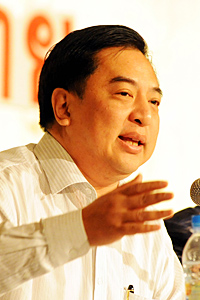
As the National Council for Peace and Order (NCPO) led by Gen Prayut Chan-o-cha approaches the end of its third year in power this Monday, its ability to govern seems to be faltering.
Although the military government has so far managed to avoid full-blown corruption scandals, it has been mired in dubious deals such as the submarine and other military procurement plans.
In addition, the government has antagonised its own supporters with a number of recent policies and decisions. For example, the cabinet's decision last week to reject the listing of more than 10,000 contracted state sector nurses as civil servants triggered a protest by the nurses, forcing the government to reverse its decision. The reshuffling of bureaucrats through the use of Gen Prayut's Section 44 special power led to dissatisfaction and apathy. The coalition of groups that gave the green light for the coup d'etat of 2014 seems to be breaking apart as interests diverge.

Suranand Vejjajiva was secretary-general to the prime minister during the Yingluck Shinawatra government and is now a political analyst.
Under the current regime, suppression of freedom of speech continues to damage the nation's credibility on the international front, while the economy is in the doldrums, especially at the grassroots level.
Critics of the regime, who believe in democracy, may rejoice at the failure of this authoritarian government. If the NCPO sticks to its commitment to call a general election within the time frame required by law, the return to the democratic process with an elected parliament will turn politics to a new page -- no matter how limited the freedom under the set rules.
On the other hand, if the NCPO tries to hold on to power longer, an uprising could be anticipated, and the new page would rid politics of the military. This happened before following the October 1973 and May 1992 bloody protests. During those times, the military was condemned to the point their personnel could not wear uniforms on the streets.
But then, the vicious cycle always returned. Elected governments prone to corruption scandals and abuses of power invited the military to stage coups.
For instance, the government of Gen Chatichai Choonhavan during 1988-1990 became caught up in this vicious cycle.
Gen Chatichai was a popular figure with close ties to the military. His government's policies were progressive, especially foreign policy which called on neighbouring countries to "turn a war zone into a trade zone". The country was then on its way to becoming the "fifth tiger" of Asia with double-digit economic growth, following South Korea, Hong Kong, Taiwan and Singapore.
Towards the end, however, the government was embroiled in corruption scandals associated with many large investment projects. It was dubbed the "Buffet Cabinet" because the then ministers were accused of taking bribes and commissions from projects they initiated like they were taking their turn in a buffet queue. Parliament, with the majority of MPs coming from government coalition parties, was ineffective as a checks and balances mechanism. The government was rebuked and branded as "a tyranny of the majority" -- the term which was also later used against the governments of Thaksin Shinawatra more than a decade later.
Gen Chatichai fell out with strongman, Gen Suthorn Kongsompong, over a military reshuffle. The attempt to appoint Gen Arthit Kamlang-ek as defence minister broke the camel's back. It was viewed by the top brass that Gen Chatichai would force his way into appointing the top military commanders. Gen Sunthorn took power in the Feb 23, 1991 coup.
The Thaksin Shinawatra government faced a similar fate even though democracy was supposed to have taken a firmer hold under the 1997 Constitution, the so-called "People's Constitution".
A progressive and popular premier with innovative platforms and a clear mandate from voters, Thaksin moved the country ahead following the fallout from the economic crisis and the supervision of the International Monetary Fund (IMF). His government's universal healthcare programme and a series of income-generating initiatives consolidated his supporter base among the grass roots and the unfortunates.
As Thaksin began a programme to reform the bureaucracy, stakeholders within the system started to resist. His military top brass appointments favouring his classmates and his cousin, Gen Chaisith Shinawatra to become army commander unravelled the support of the more influential. His direct break with the Bangkok elites made them antagonistic.
But it was corruption scandals that broke the public's trust and opened a window of opportunity for his political enemies to attack his government. The CTX bomb scanner procurement scandal was a major watershed. After this and other corruption allegations, Thaksin, even when re-elected with an absolute majority in parliament, was weakened. The controversial sale of Shin Corp shares, held by his two children, to Singapore's Temasek revitalised the opposition resulting in prolonged street protests by the "yellow shirt" movement led by Sondhi Limthongkul, Thaksin's long-time friend and ally. The movement led to the coup d'etat of Sept 19, 2006.
The means to power effect the use of power. The vicious cycle in Thai politics has seen different kinds of coalitions and individuals who supported the rise to power of various prime ministers and governments. Some have had a sense of public service and pursue policies and platforms for the betterment of the nation. But there were many self-interest groups who did not serve the public interest but took advantage of the situation by sometimes abusing and breaking rules and laws.
As conditions change and alliances shift, promises and commitments among interest groups break. The same business oligarchs who once supported elected political parties can change to support a coup and a military government. The elites are usually aligned with whoever provides them with benefits, irrespective of whether the government is democratic or authoritarian.
As part of this vicious cycle, the leader of a coalition government always needs support from his or her coalition partners and cannot ditch any party or faction caught up in any scandal. Similarly, Gen Prayut needs the trust and support of the elites, army generals and colonels.
An army commander-in-chief who feels under threat of being relieved of his post could muster forces and take matters into his own hands with promises of glory for his classmates and subordinates. The technocrats serve any government in power. The media take sides and turn a blind eye on certain issues.
Elected politicians, did and could again in the near future, raise their hands to back a non-elected premier -- just to retain their share of power.
So, is Thailand condemned to this vicious cycle of coups and elections, of corrupt and failed governments, and of defunct policies? Of power grabbing in the name of the rights and liberties of the people, but without any true respect?
The answer, sadly, is caught in a void.
